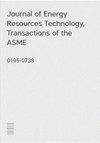Investigation on the long term stability of multiple salt caverns underground gas storage with interlayers
IF 2.4
3区 工程技术
Q3 ENERGY & FUELS
Journal of Energy Resources Technology-transactions of The Asme
Pub Date : 2023-02-17
DOI:10.1115/1.4056938
引用次数: 1
Abstract
Salt cavern underground gas storage (UGS) has attracted more and more attention worldwide for high peak shaving efficiency and high short-term throughput. To ensure the safe operation of this type of UGS, it is necessary to evaluate and analyze its stability. This paper investigates the influences of interlayers and cavern interactions on salt cavern UGS' stability. A 3D geomechanical model of double salt caverns UGS with interlayers is established based on the geological data and creep constitutive relation of salt rock. Based on the long-term creep numerical simulation, the influences of interlayer number, interlayer thickness, interlayer dip angle, interlayer stiffness, cavern spacing, and cavern pressure difference on the deformation of caverns and stability performance of UGS are studied. The results show that the UGS with greater interlayer numbers have larger cavern deformation. The increase in interlayer thickness will improve the deformation resistance of caverns, but the effect is not obvious. The UGS with an interlayer dip angle of 12.5° has the best stability. Soft interlayer will decrease the deformation resistance of caverns, while hard interlayer has the opposite effect. In addition, the UGS stability can be enhanced by reducing the pressure difference between adjacent caverns. It is reasonable that the cavern spacing is twice the cavern diameter, which is beneficial to the UGS stability and will not cause a waste of salt rock resources. Finally, the corresponding production and construction control measures are discussed according to each factor's influence degree.带夹层的多盐洞地下储气库长期稳定性研究
盐穴地下储气库以其调峰效率高、短期吞吐能力强等优点受到世界各国的广泛关注。为保证该型地下地质探测仪的安全运行,有必要对其稳定性进行评估和分析。研究了层间和洞室相互作用对盐洞UGS稳定性的影响。基于地质资料和盐岩蠕变本构关系,建立了带夹层的双盐洞UGS三维地质力学模型。在长期蠕变数值模拟的基础上,研究了夹层数、夹层厚度、夹层倾角、夹层刚度、洞室间距、洞室压差等因素对洞室变形及稳定性能的影响。结果表明:层间数越多,洞室变形越大;层间厚度的增加会提高洞室的抗变形能力,但效果不明显。层间倾角为12.5°的UGS稳定性最好。软夹层会降低洞室的变形抗力,而硬夹层则相反。另外,减小相邻洞室之间的压差可以提高UGS的稳定性。合理的洞室间距为洞室直径的2倍,有利于UGS的稳定,不会造成盐岩资源的浪费。最后,根据各因素的影响程度,探讨了相应的生产施工控制措施。
本文章由计算机程序翻译,如有差异,请以英文原文为准。
求助全文
约1分钟内获得全文
求助全文
来源期刊
CiteScore
6.40
自引率
30.00%
发文量
213
审稿时长
4.5 months
期刊介绍:
Specific areas of importance including, but not limited to: Fundamentals of thermodynamics such as energy, entropy and exergy, laws of thermodynamics; Thermoeconomics; Alternative and renewable energy sources; Internal combustion engines; (Geo) thermal energy storage and conversion systems; Fundamental combustion of fuels; Energy resource recovery from biomass and solid wastes; Carbon capture; Land and offshore wells drilling; Production and reservoir engineering;, Economics of energy resource exploitation

 求助内容:
求助内容: 应助结果提醒方式:
应助结果提醒方式:


